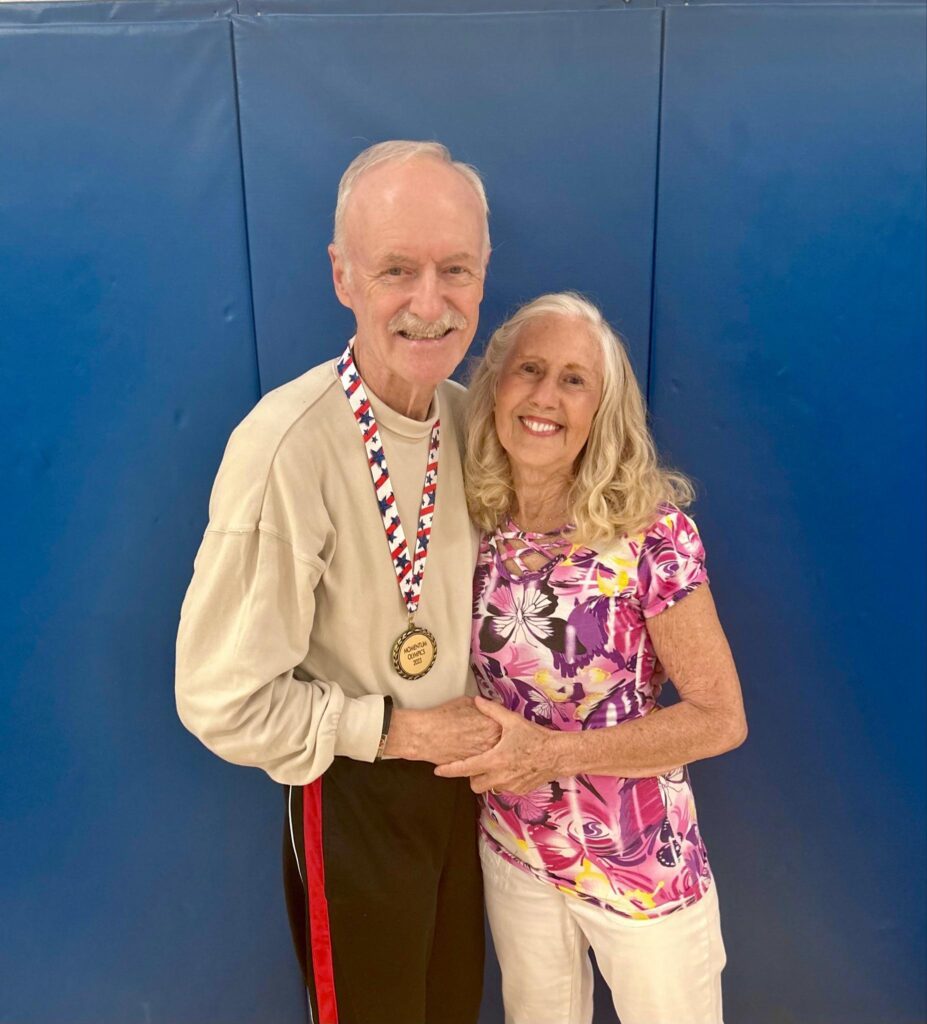Susannah Gillespie, the wellness and group fitness manager at the York JCC, shares study outcomes on participant and care partner relationships.
We all know the power of having a workout partner in the gym for motivation, support and overall well-being. The same is true for those with neurocognitive conditions participating in our Momentum program at the York Jewish Community Center in York, Pennsylvania. To learn about their unique relationship, surveys were given to program participants and their care partners.
While most studies are focused on a singular condition, our program population is composed of individuals with Parkinson’s, dementia, neuropathy, stroke, various musculoskeletal conditions, fibromyalgia, multiple sclerosis, aphasia and more. Care partners include spouses, friends and offspring (although no offspring responded to this survey).
Purpose of the Participant and Care Partner Relationships Study
- Provide an outlet where our program participants could express their current physical, mental and social condition.
- Provide an outlet where our program care partners could express their current physical, mental and social condition.
- Generate ideas to help provide new program offerings to help program participants and their care partners to feel fulfilled.
With increased life expectancy for both general populations as well as populations living with Parkinson’s, there is an increased need for providing meaningful activities that help maintain individuals’ physical, mental and social well-being (Savage & Bailey, 2004).
It’s an important, and yet often overlooked, phenomena that while the close relationship a care partner has with their charge positively benefits the individual they help, it tends to have a negative impact on the mental and social health of the care partner themself (Savage & Bailey, 2004). The degree to which this changes is also dependent upon the kind of relationship between the individual who needs care and the care partner (Chappell, Dujela & Smith, 2014).
Our study was uniquely limited because of the mobile nature of our participants. As our participants come into the community center one to five times each week, we know they are a fairly mobile group. Some come with a care partner, others will drive themselves or come utilizing public transportation. Our group of participants and care partners overall would not likely have the same feelings of isolation that affect individuals who are housebound.
Participant Findings
Our study found that some of the participants’ greatest challenges include the ability to use pens/pencils and worrying about flailing in public. Participants overall reported never feeling totally confined to their home, never having feelings of loneliness or constant sadness. Overall, they feel supported by family or close friends. Participants reported not feeling embarrassed by their condition in public settings, but a significant number stated they sometimes were worried about people reacting to their visible symptoms in public.
Care Partner Findings
The overwhelming majority reported never feeling more withdrawn due to their caring role. They only sometimes worry about the future. They largely do not feel exhausted, feel like they lose their temper or feel like they are taken for granted in their care partner role.
While “caregivers of people with Parkinson’s do not typically receive formal training and possess limited knowledge of resources,” the Momentum program offered at the York JCC serves as a hub to help connect individuals in three unique ways (Boone, Henderson & Hunter, 2021).

Individuals coming to the program with Parkinson’s and their care partners have free, grant funded access to daily fitness classes designed specifically to utilize movements that will combat the degenerative nature of the disease. Being part of the classes and program provides a unique support system for the participants and their care partners either organically in the classes while working through challenges and cheering one another on, or through unique social and support activities that help families work together as a team.
Both participants and care partners know they are being challenged and motivated to work toward their best physical selves whenever they show up. They also know they have access even on non-class days to the Momentum instructors and other participants when they need to ask a question, vent, problem solve or share a win. This social support structure is, perhaps, one of the most impactful parts of the program that can partly explain some of the results reported above.
Participant and Care Partner Relationships Study Conclusion
- Participants are growing in their self-efficacy.
- Care partners do not feel as confined or burdened as we may have anticipated.
- The two greatest challenges: falling in public and using pens/pencils as fine motor skill development are tasks we are currently working on. We have plans to improve programming on fine motor skills with small group training sessions developed to improve this skill for those who need it.
References
- Boone, A. E., Henderson, W., & Hunter, E. G. (2021). Role of occupational therapy in facilitating participation among caregivers of people with Parkinson’s disease: A systematic review.
- The American Journal of Occupational Therapy, 75(3).
- Chappell, N. L., Dujela, C., & Smith, A. (2014). Spouse and adult child differences in caregiving burden.
- Canadian Journal on Aging/La Revue canadienne du vieillissement, 33(4), 462-472.
- Savage, S., & Bailey, S. (2004). The impact of caring on caregivers’ mental health: a review of the literature. Australian health review, 27(1).










